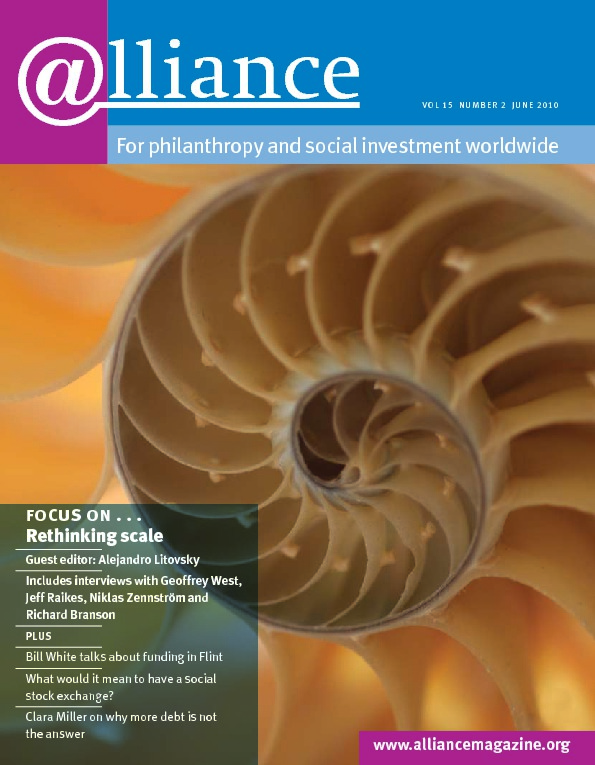 This is a new report by Mark Rosenman from Caring to Change. Based on extensive research, the report concludes that foundations should use the framework of the ‘common good’ to advance their work. Barry Knight supported the project, most notably by facilitating a retreat at Pocantico in February 2009, which reviewed and critiqued findings from the research. Here he answers some questions about the report put to him by Alliance.
This is a new report by Mark Rosenman from Caring to Change. Based on extensive research, the report concludes that foundations should use the framework of the ‘common good’ to advance their work. Barry Knight supported the project, most notably by facilitating a retreat at Pocantico in February 2009, which reviewed and critiqued findings from the research. Here he answers some questions about the report put to him by Alliance.
What makes this different from any other report looking at increasing foundation effectiveness?
This report is quite different from the avalanche of reports that focus on better planning, good governance or measuring impact. This one addresses what lies at the heart of philanthropy – its core values. The report suggests that the ancient idea of the common good provides a unifying framework for foundations to take a broad perspective on the problems they address, to bring the right people and organizations together, and to connect programmes and issues in a way that address issues of diversity, inclusion and equal opportunity in addition to their narrower purposes.
This report goes deeper than most and plunges into meanings and purposes. This territory has traditionally been placed in the ‘too difficult’ category, so most reports stick at technocratic or managerial advice. An exception is the Working Group on Philanthropy for Social Justice and Peace, which has been studying the language of social justice philanthropy. The value of the current report is that it begins to develop a language for people who are not attracted to the idea of social justice, yet wish to frame and advance their work in a larger conceptual context. I think that we are beginning to see the importance of a new dictionary of values for the field of philanthropy.
Is the conclusion that foundations can increase the effectiveness of their grantmaking by embracing the Common Good solidly based in the findings or just pious exhortation?
The findings are rooted in 150 interviews. Some of these are with the ‘who’s who’ in philanthropy, but there was a conscious effort to interview younger people, people of colour, and others in philanthropy not normally involved with setting strategy.
Mark shared emerging drafts with the people he interviewed, and spent much time reflecting on the findings with people from the sector. This iterative process has led to a soundly based product (with good material in annexes to the main report).
As for the use of ‘the common good’, this emerged from a review of the findings at a three-day workshop in Pocantico last year. The 25 people who were there expressed frustration at the difficulty the field has in expressing its values clearly, and it was agreed that Mark’s findings fit well with the notion of the common good. As a result of that meeting, Mark investigated the idea further. So the concept emerged from a group process of collective debate and synthesis.
There is a lot of talk of ‘American values’ and realizing ‘the broader promise of America’. Do the findings have resonance outside the US?
This is an American report, with an American steering panel and produced largely for an American audience. However, many of the findings are universal. To take an example, the report cites Lyndon Johnson’s use of the term ‘American values’ when he signed the 1964 Civil Rights Act. Looking after the interests of a minority also takes care of the interests of the majority. This idea is applicable everywhere.
How can the report achieve its aims? So much has gone into producing it, yet there seem to be few plans to implement it. Is this another example of foundations failing to follow through and reap the benefits of their investments?
I agree that the follow-up is not strong enough. At the end of the Pocantico retreat there were prospects that the main funders of the report would join together to advance the field. I was disappointed that this did not happen.
What needs to happen next?
The paradox is that we need a prior sense of a common good if we are to make progress on recognizing that we need to develop the common good.
I think that we need some leadership among foundations. Foundations cannot afford their splendid isolation and their pet projects outside of a common good framework if they are to be relevant. The common good is both a simple and a difficult idea, but we have to grasp it if we are to have any useful impact on our fragile world.
To download the report
http://www.caringtochange.org





Comments (1)
Greetings, This was a great interview and article. I am trying to obtain a copy of Foundations for the Common Good but Caringtochange.org is being redirected to reactdom.com. If you have a copy of Foundations for the Common Good by Mark Rosenman, please upload it here or email a copy to me. redfox